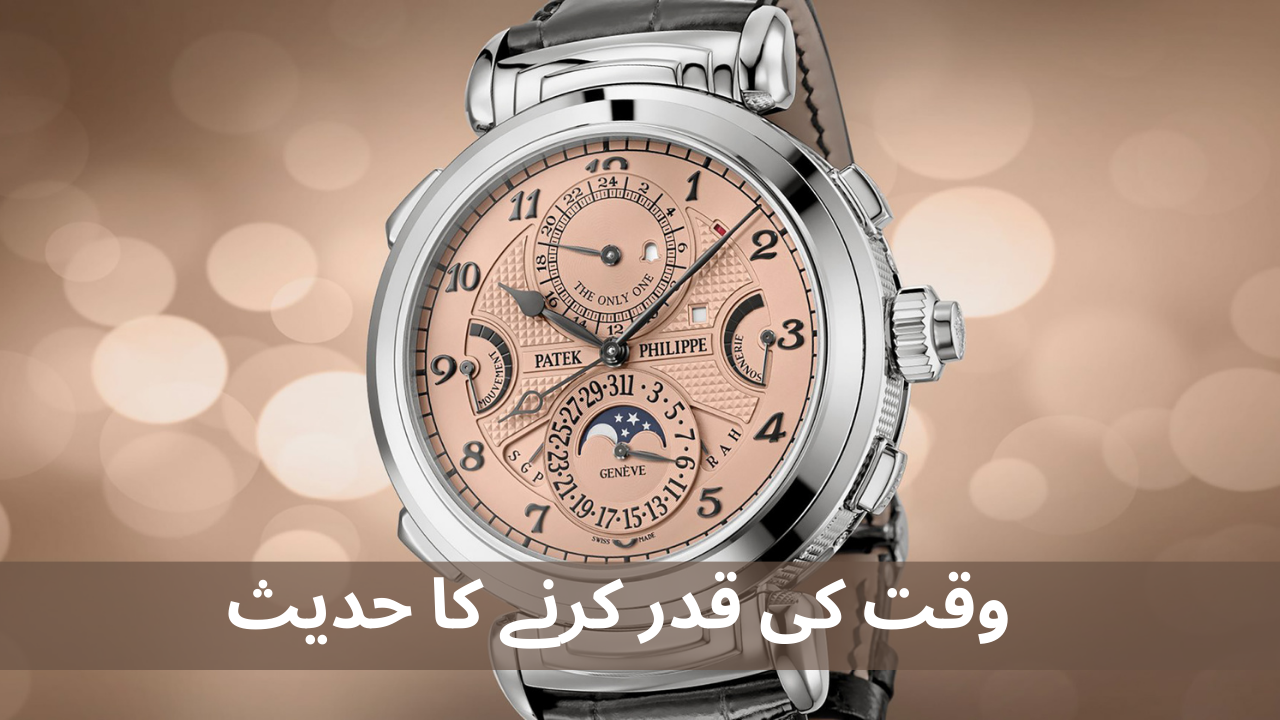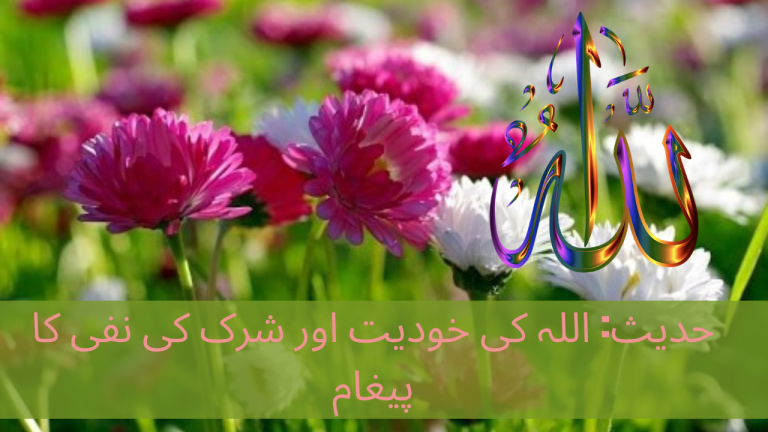Waqt Ki Qadar Karnay K Baray May Rasool Ullah Ka Hadees

Waqt Ki Qadar Karnay K Baray May Rasool Ullah Ka Hadees This noble hadith is narrated by the companion Abu Huraira (may Allah be pleased with him) and attributed to the Prophet Muhammad (peace be upon him). It carries profound meanings related to one’s understanding of their relationship with time and life.
Waqt Ki Qadar Karnay K Baray May Rasool Ullah Ka Hadees
In this hadith, it is reported that the Prophet Muhammad (peace be upon him) conveyed that Allah says: “The son of Adam abuses Dahr (the time), and I am Dahr, in My Hands are the night and the day.” This statement indicates that humans tend to complain and blame time for their difficulties, as if time itself is the cause of their problems.
However, the hadith emphasizes that time is not the source of our troubles. It is a creation of Allah, and Allah is the one who controls time. It underscores that Allah is the one who governs the night and the day. Therefore, humans should trust in Allah’s decree and accept what time brings with patience and contentment.
This hadith reminds us of the importance of optimism and confidence in Allah’s divine plan. Time is merely a passing framework, and what truly matters is how we deal with it and how we utilize it to build our spiritual and worldly lives and achieve our goals.
Hadees Of The Rasool
رواه البخاري (وكذلك مسلم)
Arabic
عَنْ أَبِي هُرَيْرَةَ رَضِيَ اللَّهُ عَنْهُ، قَالَ: قَالَ رَسُولُ اللَّهِ صَلَّى اللَّهُ عَلَيْهِ وَسَلَّمَ: “قَالَ اللَّهُ: يَسُبُّ بَنُو آدَمَ الدَّهْرَ، وَأَنَا الدَّهْرُ، بِيَدِي اللَّيْلُ وَالنَّهَارُ”
Explanation in Arabic
هذا الحديث يسلط الضوء على مفهوم الزمن وعلاقته بالطبيعة البشرية. يشير إلى أن البشر غالبًا ما يشكون من الصعوبات التي يواجهونها في الحياة ويميلون إلى إلقاء اللوم على الزمن لمشاكلهم. ومع ذلك، يُذكرنا الحديث بأن الزمن هو إبداع من الله، وأن الله هو الذي يتحكم فيه. الله يسيطر على الليل والنهار، مما يؤكد على أهمية الثقة في قضاء الله وقدره وقبول ما يأتي بصبر ورضا.
Urdu
حضرت ابو ہریرہ (رضی اللہ تعالی عنہ) سے روایت ہے کہ پیغمبر محمد صلی اللہ علیہ وآلہ وسلم نے فرمایا: “اللہ کہتے ہیں: ‘آدم کے بیٹے وقت (زمانے) کو گالی دیتے ہیں، اور میں ہوں وقت، میرے ہاتھوں میں رات اور دن ہیں۔'”
Urdu Explanation
یہ حدیث وقت کے تصور اور اس کے انسانی فطر سے متعلق ہے۔ اس میں انسانوں کو یاد دلایا گیا ہے کہ وہ زندگی کی مشکلات کو شکایت کرتے ہیں اور عموماً اپنی مشکلات کا ذمہ دار وقت کو قرار دیتے ہیں۔ تاہم، حدیث یہ یاد دلاتی ہے کہ وقت اللہ کی تخلیق ہے، اور اللہ ہی وہی ہیں جو اسے کنٹرول کرتے ہیں۔ اللہ رات اور دن کو انتظام کرتے ہیں، جس سے واضح ہوتا ہے کہ ہمیں اللہ کی مقدرت پر اور جو کچھ ہمارے سامنے آتا ہے اس پر صبر اور رضا کرنا چاہئے
Certainly, here is the Hadith in English, Urdu, and Arabic, along with a detailed explanation:
English: Narrated by Abu Huraira (may Allah be pleased with him): The Prophet Muhammad (peace be upon him) said: “Allah says: ‘The son of Adam abuses Dahr (the time), and I am Dahr, in My Hands are the night and the day.'”
Explanation in English: This Hadith emphasizes the concept of time and its relation to human nature. It conveys that humans often complain about the difficulties they face in life and tend to blame time for their problems. However, the Hadith reminds us that time is a creation of Allah, and He is the one who controls it. Allah governs night and day, emphasizing that we should trust in Allah’s divine plan and accept what comes our way with patience and contentment.
Benefits Of This Hadees
The Hadith you mentioned, which emphasizes the relationship between humans and time, carries several important benefits and lessons for believers:
- Trust in Allah’s Plan: This Hadith teaches us to trust in Allah’s divine plan and decree. It reminds us that Allah is the ultimate controller of time and that everything that happens is a part of His divine wisdom.
- Patience and Contentment: Understanding that Allah controls time encourages believers to be patient in the face of difficulties and to be content with what they have. Rather than blaming time for their problems, believers are reminded to accept the trials and tribulations of life with patience.
- Optimism and Positivity: Believers are encouraged to adopt a positive outlook on life. Instead of dwelling on the negative aspects of time, they should focus on making the most of their time and using it to fulfill their spiritual and worldly goals.
- Reflection and Self-Improvement: This Hadith prompts believers to reflect on how they use their time. It encourages them to assess their actions and make positive changes to become better individuals and fulfill their responsibilities as stewards of time.
- Respect for Time: It reminds us of the value of time and encourages us to use it wisely. Time is a precious resource, and understanding that Allah controls it should motivate us to make the most of every moment.
- Less Blame-Shifting: Instead of blaming external factors like time for their problems, believers are encouraged to take responsibility for their actions and decisions. This can lead to personal growth and accountability.
- Spiritual Growth: Recognizing that Allah is the ultimate controller of time can deepen one’s faith and spirituality. Believers are reminded that they should turn to Allah in times of need and seek His guidance and assistance.
- Gratitude: Understanding that time is a gift from Allah can lead to a sense of gratitude. Believers are reminded to be thankful for the time they have been given and to use it in a manner that pleases Allah.
In summary, this Hadith offers valuable guidance on how believers should perceive and interact with time, emphasizing trust in Allah, patience, gratitude, and personal responsibility. It encourages a positive and proactive approach to life’s challenges and opportunities.
Conclusion
In conclusion, the Hadith that emphasizes the relationship between humans and time offers profound lessons for believers. It underscores the importance of trusting in Allah’s divine plan, being patient in the face of difficulties, and adopting a positive outlook on life. Believers are encouraged to use their time wisely, take personal responsibility for their actions, and appreciate the value of time as a gift from Allah.
This Hadith serves as a source of guidance for personal growth, spiritual development, and a deeper connection with Allah. Ultimately, it reminds us that time is a tool through which we can fulfill our responsibilities and strive for a life that is pleasing to Allah.





